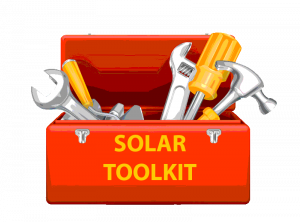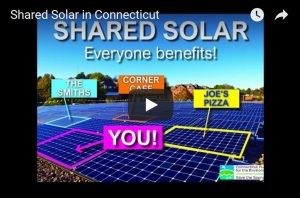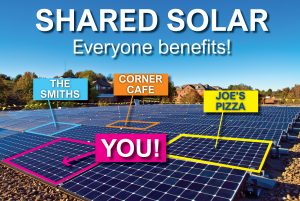Share the Sun

Solar power is fast becoming cheaper than dirty sources of fuel like coal and gas. Solar is clean, renewable, stable, and can lower electric bills.
For years, Connecticut residents have paid some of the highest electric rates in the continental US. By mid-2018, about 30,000 Connecticut residents have taken advantage of lower-cost energy independence with solar panels on their roofs.
But what about the rest of us? Four out of five Connecticut residents can’t benefit from rooftop solar because their roofs are too shady or face the wrong direction, or because they rent their homes or live in multi-family buildings. You can help change that—sign the petition now.
In many states—including our neighbors, Massachusetts and New York—shared solar is the solution. Shared solar allows any electricity customer to get a portion of the power produced by a larger solar array, with the benefits automatically credited to their bill and without having to install solar panels.
GET YOUR SHARED SOLAR TOOLKIT HERE!
 Get Shared Solar Near You: The How-To Toolkit for Your Community
Get Shared Solar Near You: The How-To Toolkit for Your Community
No need to wait for all the details to be ironed out–there’s lots you can do today to start getting shared solar up and running.
Explore our Shared Solar Toolkit to check out all the ways you can help expand shared solar in Connecticut, and click here to download the toolkit as a PDF.
Send your questions or suggestions to alexrodriguez@savethesound.org.
Learn More about Shared Solar
Watch this four minute video to learn more about shared solar.
How can we fight back against old-fashioned energy and bring the economic, health, and environmental benefits of solar to all Connecticut residents? By uniting everyone who wants lower electric bills, a cleaner planet, and a stronger economy into an unstoppable movement.
Harness your power. Demand solar access for all. Sign the petition.
As Shared Solar Grows, Connecticut’s Economy Will Grow
According to a 2017 report by Vote Solar, a 200-megawatt shared solar program would bring Connecticut:
- 2,580 full time jobs during construction and an additional 104,000 hours of work associated with maintenance over time.
- $192 million in earnings for those construction and maintenance workers.
- $374 million in economic benefits, plus $81 million in local tax revenues.
Download our webinar to learn more about shared solar.
Shared Solar Means Solar for All
 Everyone who uses electricity should be able to benefit from solar, not just those who own their homes.
Everyone who uses electricity should be able to benefit from solar, not just those who own their homes.
Save the Sound is fighting to bring shared solar to communities that don’t otherwise have access to solar. Too often, the families who put much of their income towards their energy costs and live in neighborhoods most affected by pollution are the same families who can’t access solar. Shared solar is the best way to bring energy fairness to our communities.
Cities and towns, like New Haven, Hartford, Williamantic, Canton, Bloomfield, Woodbridge, and more, are fighting for shared solar by adopting resolutions urging state leaders to pass a full-scale, state-wide program with no barriers to participation. Want to get your city or town involved? Click here for a factsheet on how you can get your town or city to pass a resolution or send us an email to alexrodriguez@savethesound.org.
LEGISLATIVE HISTORY AND UPDATES
In 2015, legislators approved a very small (6MW) pilot program. After two rounds of Requests for Proposals, DEEP chose three developers in June 2017. The projects are expected to be up and running in 2019.
In 2018, after several years, Save the Sound and allies helped pass a shared solar law at the General Assembly. It was part of the omnibus energy bill, Public Act 18-50. Here are the major provisions of the newest shared solar law, mostly contained in Section 7 of the act:
- 25 MW per year for 6 years (150 MW total). Capacity not developed in one year cannot be carried over to the next.
- Set-asides for low-income and low/moderate income customers:
- At least 10%+ of every project must go to low-income customers.
- At least an additional 10% must go to low- or moderate-income customers, or low-income service organizations.
- To be eligible, other residential customers must demonstrate they are unable to install solar at their homes.
- Businesses, the state, and towns, are all eligible to participate.
- Starts in January 2020.
Changes were made in 2019 during administrative proceedings, including:
- The subscription process was streamlined and administrative burden reduced on shared solar project developers by transferring responsibility for identifying and enrolling subscribers to the electric utilities.
- The program was revised to authorize previously allocated, but unbuilt, megawatt capacity to be added to the cap for future solicitation years.
- Utilities are now in charge of subscribing the 20% voluntary enrollment portion of a project’s capacity. Save the Sound is concerned that under the Modified Program Requirements, there is no incentive for the electric companies to subscribe this reserved 20% capacity, although they are required to advertise the availability of subscription capacity.
As the program details are further developed, Save the Sound will continue to advocate for strong outreach and partnerships between the utilities and third-parties to ensure full subscription. If you would like more information, contact alexrodriguez@savethesound.org.

